How Loan Terms Influence Dental Practice Loan Rates and Repayment Plans
October 23, 2025 | Last Updated on: October 23, 2025

Key Takeaways:
- What determines dental practice loan rates in the U.S.
- How loan length affects dental practice loan interest rates and total repayment costs.
- The relationship between repayment structure and cash flow management.
- Tips for choosing the ideal dental practice financing rates.
- Common mistakes dentists make when selecting dental office loans.
Launching or expanding a dental office in the U.S. typically involves a significant financial investment. One needs funds for things like renting commercial real estate space, buying dental equipment, hiring employees, and covering day-to-day expenses. Dental practice loans can help cover these upfront costs.
But not every loan is the same. Details such as the repayment term, payment schedule, and other conditions can all impact the dental practice loan rates, monthly payments, and overall financial health.
Knowing how the length and setup of a loan impact the costs can help businesses make better choices for their practice's finances and long-term success.
In this article, discover the best practices to find an ideal dental business loan term with lower interest rates, to manage cash flow and support steady growth for a dental practice.
What are Dental Practice Loan Rates?
Dental practice loan rates are more than just numbers. These rates shape a dental clinic's monthly budget, long-term profits, and how soon it sees returns on new dental equipment. Even a 1 to 2 percent difference in these rates can result in thousands of dollars in additional costs over the life of the loan.
In the U.S., most of the dental practice loan rates are not fixed. They vary based on several factors, like:
- Business credit score: Lenders look at how responsibly a business has handled debt in the past. A good credit score may earn the business a lower rate.
- Loan amount and type: Larger loans or loans secured by assets (such as equipment or real estate) often come with lower dental practice loan rates.
- The lender's assessment of risk: Every lender has their own criteria for evaluating how likely a business is to repay.
- Market conditions: If national interest rates rise or fall (for example, following a Federal Reserve decision), the loan offer may also be adjusted accordingly.
- Collateral and repayment term: Loans secured by property or with shorter repayment periods may have better rates.
The specific rate a business receives depends on the type of loan, its collateral, and its credit history. For dental practices, lenders usually offer rates toward the higher end of this range because these businesses require more capital and carry more risk.
SBA loans, guaranteed by the U.S. Small Business Administration, often offer lower dental business loan rates for qualified applicants.
Businesses can choose between fixed-rate and variable-rate loans. With a fixed-rate loan, the interest rate stays the same for the whole term, making it easier to plan the budget. However, with a variable-rate loan, the interest rate may be lower at the start, but it may increase if market rates rise. This is why with variable rates, payments are less predictable over time.
How Loan Terms Affect Dental Practice Loan Rates?
The loan term is one of the biggest factors influencing your interest rate and total borrowing cost. It plays a major role in shaping both your interest rate and the overall cost of a dental practice loan.
Shorter terms usually mean:
- Higher monthly payments, but
- You save money on interest in the long run.
Longer terms mean:
- Lower monthly payments, but
- You pay more in interest overall as it quietly accumulates over the years.
The term for dental office loans largely depends upon the loan size, business plan, and credit approval. Many popular lenders like Bank of America (Member FDIC), Wells Fargo, and PNC offer dental business loans for a similar term.
When financing commercial real estate, dental office loans typically have terms ranging . The same applies if a business borrows to purchase an existing dental practice. These loans tend to be more expensive, as both the interest rates and loan terms are higher.
Comparison: How Loan Terms Impact Costs
The length of your loan directly shapes both your monthly payments and your overall borrowing cost. A short-term loan helps you pay off debt faster and save money on interest, but it can put more pressure on your monthly cash flow because the payments are higher.
A long-term loan, on the other hand, spreads the balance over more years. This keeps monthly payments lower and easier to manage but increases the total amount of interest you'll pay by the end of the loan.
Think of it as a trade-off between short-term comfort and long-term cost. If your practice is new and still building steady revenue, a longer term can help preserve cash for operations and growth. But if you have predictable income and want to minimize interest, choosing a shorter term can save you money over time.
For a dental practice owner, finding the right balance is key, especially if your practice is in its startup phase or if you plan to reinvest early profits into marketing, new equipment, or staff.
Loan Structure and Repayment Plans
The structure of a loan also affects dental practice loan rates. Here are the main types of loan structures:
- Amortized term loans have fixed monthly payments that pay down both the principal and the interest.
- Interest-only loans start with lower payments, which can be helpful during the setup or renovation of the clinic.
- Balloon loans offer lower monthly payments but require a large lump sum payment at the end of the term.
- Lines of credit offer flexible borrowing, making them useful for covering recurring expenses or meeting short-term working capital needs.
Choosing the right structure depends on the business revenue pattern. A new practice might prefer an interest-only structure in the first year to manage cash flow, while an existing dental practice with steady income may benefit from fully amortized repayment to minimize total cost.
How Loan Conditions Affect Dental Practice Loan Rates
Every lender looks at risk before deciding what dental practice loan rates to offer. In simple terms, they're trying to predict how safe it is to lend you money. The lower the risk, the better your chances of getting a lower rate.
When you apply for a dental practice loan, lenders don't just check one thing;- they look at your entire financial picture. They want to know how strong your credit history is, how your business manages cash flow, and whether you have valuable assets like real estate or dental equipment to secure the loan.
Each of these factors helps the lender decide how much interest to charge you. A well-prepared dental practice owner with solid credit, reliable income, and a clear business plan is more likely to qualify for lower dental practice loan rates than someone with unstable finances or limited collateral.
Here are some of the main factors that directly influence your rate:
- Credit score: A score over 740 can help businesses qualify for interest rates that are lower.
- Collateral: If a business secures its loan with real estate or dental equipment, lenders see it as less risky and often offer better interest rates.
- Loan type: SBA-backed loans often offer lower rates for dental practice financing compared to private business loans.
- Loan amount: Applying for a larger loan with strong finances and good credit can help businesses get a lower rate from top lenders.
- Debt-to-income ratio: Lenders use this to judge how easily you can repay the loan.
Many lenders also look at your business plan, checking account history, and underwriting profile before determining eligibility.
Choosing the Right Term for Dental Practices
The "ideal" loan term isn't universal, it depends on your practice's goals, stage, and cash flow.
Here's how to decide:
- Use conservative estimates to calculate how much monthly payment the business can afford.
- Compare loan options from different banks or SBA-approved lenders.
- Always get at least 2–3 quotes.
- Evaluate total cost, not just the rate.
- Use an online calculator to estimate long-term impact.
- Match the loan to the business goal.
- Short-term loan (3–5 years): Ideal for equipment or renovation.
- Medium-term loan (7–10 years): Suitable for expanding staff or buying a new practice.
- Long-term loan (15–20 years): Common for commercial real estate or large practice acquisition.
Refinancing for Effective Rate Management
When market rates go down or your business credit score gets better, it may be a good time to think about refinancing your dental office loan.
Refinancing can help businesses:
- Reduce their dental practice loan rates.
- Combine multiple debts into one simple and manageable payment.
- Shorten their term and save on total interest cost.
However, before refinancing, review the application process carefully and check for any prepayment penalties. Refinancing is subjective and may not always be beneficial. So, the businesses must go through all the terms and conditions and see if the loan actually aligns with their needs.
Common Mistakes Dentists Make
Avoid these missteps when comparing dental practice loan rates and terms:
- Choosing the longest term to "feel safer", without realizing higher total cost.
- Ignoring credit score improvement before applying.
- Not comparing loan options from multiple lenders.
- Overlooking prepayment penalties and loan conditions.
- Skipping business plan review before starting the loan application.
Final Thoughts
The loan terms of a business have a big impact on their dental practice loan rates and how they manage repayments. Businesses should aim to find a balance between affordable payments and long-term costs. This balance in financing helps businesses grow without putting too much pressure on their budgets.
To make an informed decision, businesses must consider multiple lenders and compare their terms and policies. Improving your credit score can help secure more favorable terms. When market rates drop, planning refinancing can help businesses reduce their total interest cost. A well-structured practice financing strategy not only helps businesses manage their day-to-day expenses but also builds a solid foundation for future expansion.
For businesses just starting out, or planning to buy into a practice, or just expanding their current dental clinic, it is important to review all loan options, negotiate terms, and update them as the business changes. Careful, informed financing choices can help turn a basic loan into a key part of long-term success in dentistry.
FAQs About Dental Practice Loan Rates
1. What is the average range for dental practice loan rates in the U.S.?
In 2025, dental practice loan rates typically depends on the type of loan, what you use as collateral, and the lender's rules.
2. How do loan terms affect dental practice loan interest rates?
Shorter loan terms usually mean lower interest rates but higher monthly payments. Longer terms come with slightly higher rates and more total interest. If you can handle large-scale payments each month, a shorter term might be better for you.
3. What are common financing options for dental offices?
Dental office owners can chooseoptions like term loans, business lines of credit, SBA loans, or real estate loans. Each option has different terms and interest rates, so it's essential to choose one that fits your needs.
4. Can I refinance an existing dental office loan?
Dental practice owners can refinance to secure lower rates, reduce their monthly payments, or pay off their loans more quickly.
5. How can I qualify for better dental business loan rates?
To qualify for better dental practice loan rates, maintain a high credit score, manage your cash flow effectively, and establish a strong relationship with your lender. A strong business plan and accurate financial records also help your chances.
Frequent searches leading to this page
Term Loans are made by Itria Ventures LLC or Cross River Bank, Member FDIC. This is not a deposit product. California residents: Itria Ventures LLC is licensed by the Department of Financial Protection and Innovation. Loans are made or arranged pursuant to California Financing Law License # 60DBO-35839




